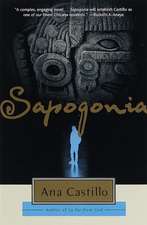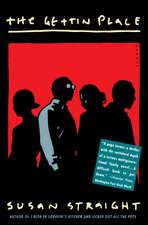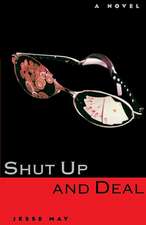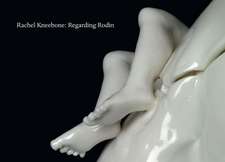The Book Lover
Autor Ali Smithen Limba Engleză Paperback – 31 oct 2008
The Book Lover is a treasure trove of what Ali Smith has loved over the course of her reading life, in her twenties, as a teenager, as a child. Full of pieces from amazing writers like Sylvia Plath, Muriel Spark, Grace Paley, and Margaret Atwood, it also has a wonderful selection of lesser-known authors like Joseph Roth, only just gaining proper status now, and Clarice Lispector, a Brazilian genius who's far too underpublished. From surprising figures like Beryl the Peril, Billie Holliday, and Lee Miller to unusual selections from the most prominent writers in history, The Book Lover is an intimate, personal anthology that gives readers a glimpse of how writers develop their craft—by reading other writers.
Preț: 144.29 lei
Nou
Puncte Express: 216
Preț estimativ în valută:
27.61€ • 28.83$ • 22.80£
27.61€ • 28.83$ • 22.80£
Carte tipărită la comandă
Livrare economică 11-17 aprilie
Preluare comenzi: 021 569.72.76
Specificații
ISBN-13: 9780307386083
ISBN-10: 0307386082
Pagini: 470
Dimensiuni: 130 x 198 x 28 mm
Greutate: 0.43 kg
Editura: Anchor Books
ISBN-10: 0307386082
Pagini: 470
Dimensiuni: 130 x 198 x 28 mm
Greutate: 0.43 kg
Editura: Anchor Books
Notă biografică
Ali Smith is the author of six works of fiction, including the novel Hotel World, which was shortlisted for both the Orange Prize and the Booker Prize in 2001 and won the Encore Award and the Scottish Arts Council Book of the Year Award in 2002, and The Accidental, which won the Whitbread Award in 2005 and was shortlisted for the 2005 Man Booker Prize and the 2006 Orange Prize. Her story collections include Free Love, which won the Saltire First Book Award and a Scottish Arts Council Award, and The Whole Story and Other Stories. Born in Inverness, Scotland, in 1962, Smith now lives in Cambridge, England.
Extras
GIRLS
JANE AUSTEN
Northanger Abbey
Chapter 1
No one who had ever seen Catherine Morland in her infancy, would have supposed her born to be an heroine.
MARGARET ATWOOD
The Poet Has Come Back . . .
The poet has come back to being a poet
after decades of being virtuous instead.
Can't you be both?
No. Not in public.
You could, once,
back when God was still thundering vengeance
and liked the scent of blood,
and hadn't got around to slippery forgiveness.
Then you could scatter incense and praise,
and wear your snake necklace,
and hymn the crushed skulls of your enemies to a pious chorus.
No deferential smiling, no baking of cookies,
no I'm a nice person really.
Welcome back, my dear.
Time to resume our vigil,
time to unlock the cellar door,
time to remind ourselves
that the god of poets has two hands:
the dextrous, the sinister.
DJUNA BARNES
The Terrible Peacock
It was during the dull season, when a subway accident looms as big as a Thaw getaway, that an unusual item was found loose in the coffee.
Nobody seemed to know whence it had come. It dealt with a woman, one greater, more dangerous than Cleopatra, thirty-nine times as alluring as sunlight on a gold eagle, and about as elusive.
She was a Peacock, said the item, which was not ill-written – a slinky female with electrifying green eyes and red hair, dressed in clinging green-and-blue-silk, and she was very much observed as she moved languorously through the streets of Brooklyn. A Somebody – but who?
The city editor scratched his head and gave the item to Karl.
“Find out about her,'' he suggested.
“Better put a new guy on,'' said Karl. "Get the fresh angle. I got that Kinney case to look after today. What about Garvey?''
“All right,'' said the city editor, and selected a fresh piece of gum.
Garvey was duly impressed when Karl hove to alongside his desk and flung his leg after the item onto it, for Karl was the Star.
Rather a mysterious person in a way, was Karl. His residence was an inviolable secret. He was known to have accumulated money, despite the fact that he was a newspaperman. It was also known that he had married.
Otherwise, he was an emergency man – a first-rate reporter. When someone thought best to commit suicide and leave a little malicious note to a wife who raved three steps into the bathroom and three into the kitchen, hiccuping "Oh, my God!'' with each step, it got into Karl's typewriter – and there was the birth of a front-page story.
“So you're to look her up,'' said Karl. She's dashed beautiful, has cat eyes and Leslie Carter hair – a loose-jointed, ball-bearing Clytie, rigged out with acomplexion like creamed coffee stood overnight. They say she claws more men into her hair than any siren living or dead.''
"You've seen her?'' breathed Garvey, staring.
Karl nodded briefly.
"Why don't you get her, then?''
“There are two things,'' said Karl judicially, at which I am no good. One is subtraction, and the other is attraction. Go to it, son. The assignment is yours.''
He strolled away, but not too late to see Garvey swelling visibly at the implied compliment and caressing his beautiful, lyric tie.
Garvey didn't altogether like the assignment, nonetheless. There was Lilac Jane, you see. He had a date with her for that very night, and Lilac Jane was exceedingly desirable.
He was at that age when devotion to one female of the species makes dalliance with any others nothing short of treason.
But – he had been allotted this work because of his fascina¬tions for slinky green sirens! Garvey fingered the tie again and withdrew his lavender scented handkerchief airily, as an altar-boy swings a censer.
At the door he turned under the light and pushed back his cuff, and his fellow workers groaned. It was seven by his wristwatch.
Outside he paused on the corner near the chophouse. He looked up and down the gloomy street with its wilted florist-window displays and its spattering of gray house fronts, wishing there were someone with him who could be told of his feeling of competence in a world of competent men.
His eyes on the pavement, lost in perfervid dreams of Lilac Jane, he wandered on. The roaring of the bridge traffic disturbed him not, nor the shouts of bargemen through the dusk on the waterfront.
At last through the roseate visions loomed something green.
Shoes! Tiny shoes, trim and immaculate; above them a glimpse of thin, green stockings on trimmer ankles.
There was a tinkle of laughter, and Garvey came to himself, red and perspiring, and raised his eyes past the slim, green-clad body to the eyes of the Peacock.
The Terrible Peacock
It was she beyond question. Her hair was terribly red, even in the darkness, and it gleamed a full eight inches above her forehead, piled higher than any hair Garvey had ever seen. The moon shone through it like butter through mosquito netting.
Her neck was long and white, her lips were redder than her hair, and her green eyes, with the close-fitting, silken dress, that undulated like troubled, weed-filled water as she moved, com¬pleted the whole daring creation. The powers that be had gone in for poster effects when they made the Peacock.
She was handsome beyond belief, and she was amused at Garvey. Her silvery laugh tinkled out again as he stared at her, his pulse ahundred in the shade.
He tried to convince himself that this physiological effect was due to his newspaper instinct, but it is to be conjectured that Lilac Jane would have had her opinion of the Peacock had she been present.
"Well, young man?'' she demanded, the wonderful eyes getting in their deadly work.
“I – I'm sorry – I didn't mean –" Garvey floundered hopelessly, but he did not try to escape.
“You were handing me bouquets by staring like that? That what you're trying to say?''
She laughed again, glided up to him and took his arm. "I like you, young man,'' she said.
“My nun-name is Garvey, and I'm on the – the Argus.''
She started at that and looked at him sharply. “A reporter!''
But her tinkly laugh rang out again, and they walked on.
“Well, why not?'' she said gaily.
Then, with entire unexpectedness: “Do you tango?''
Garvey nodded dumbly, struggling to find his tongue.
“I love it!'' declared the Peacock, taking a step or two of the dance beside him. "Want to take me somewheres so we can have a turn or two?''
Garvey swallowed hard and mentioned a well-known resort.
“Mercy!'' cried the green-eyed siren, turning shocked orbs upon him. "I don't drink! Let's go to a tearoom – Poiret's.'' She called it Poyrett's.''
Garvey suffered himself to be led to the slaughter, and as they went she chattered lightly. He drew out his handkerchief and dabbed gently at his temples.
“Gracious!'' she drawled. You smell like an epidemic of swooning women.''
Garvey was hurt, but deep within himself he decided suddenly that scent was out of place on a masculine cold-assuager.
They turned into abrightly lighted establishment where there were already a few girls and fewer men.
They found a table, and she ordered some tea and cakes, pressing her escort not to be bashful as far as himself was concerned. Garvey ordered obediently and lavishly.
Presently the music struck up, and he swung her out on the floor and into the fascinating dance.
Now, Garvey was really some dancer. But the Peacock!
She was light and sinuous as a wreath of green mist, yet solid bone and muscle in his arms.
She was the very poetry of motion, the spirit of the dance, the essence of grace and beauty.
And when the music stopped, Garvey could have cried with vexation, though he was considerably winded.
But the Peacock was not troubled at all. Indeed, she had talked on through all the dance.
Garvey had capitulated long ago. Lilac Jane? Bah! What were a thousand Lilac Janes to this glorious creature, this Venus Anadyomene – Aphrodite of the Sea-Foam?
In the bright light of the tearoom her green eyes were greener, her red hair redder, her white throat whiter. He would have given a Texas ranch for her, with the cattle thrown in.
He tried to tell her something of this, and she laughed delight¬fully.
“What is it about me that makes men go mad over me?'' she demanded, dreamily sipping her tea.
“Do they?'' He winced.
“Oh, shamelessly. They drop their jaws, propriety, and any bundles they may be carrying. Why?''
“It's the most natural thing in the world. You have hair and eyes that few women have, and a man desires the rare.'' He was getting eloquent.
But – I'm not at all pretty – thinness isn't attractive, is it?''
“It is, in you,'' he said simply. The fact that he could say it simply was very bad indeed for Lilac Jane.
She dimpled at him and arose abruptly. “Now I've got to vanish. Oh, Lily!''
A girl, undeniably pretty, but just an ordinary girl, crossed over.
“This is Mr. – er – Garvey, Miss Jones. Keep him amused, will you? He dances very nicely.'' And as he struggled to his feet, attempting a protest: Oh, I'm coming back again,'' and she was gone.
Garvey tried to think of some excuse to escape from the partner thus unceremoniously thrust upon him, but the girl blocked his feeble efforts by rising expectantly as the strains of "Too Much Mustard'' floated on the ambient atmosphere.
There was nothing for it but to make good. And, after all, she was a nice dancer. He found himself asking what she would have at the end of the dance.
Anyhow, he reflected, he had still his assignment to cover. The Peacock was still as great a mystery as ever – more of a mystery. But she had said that she would return. So he waited and danced and ate and treated.
Half an hour later the Peacock did return – with another man.
To Garvey everything turned suddenly light purple. That was the result of his being green with jealousy and seeing red at the same time.
The newest victim of her lures (for such even Garvey recog¬nized him to be) was an elderly business man, inclined to corpulency, with a free and roving eye. Garvey hated him with a bitter hatred.
The Peacock danced once with him, then abandoned him, gasping fishily, to another girl's tender mercies.
She stopped briefly at Garvey's table, gave him a smile and a whispered: Here, tomorrow night,'' and vanished in a swirl of green silk – probably in search of more captives.
Garvey put in a bad night and a worse next day. Who was she? What was her little game? What would happen tomorrow night?
He didn't care. Lilac Jane was definitely deposed in favor of a green goddess whose lure quite possibly spelled destruction.
But he didn't care.
He told the city editor that the Peacock story would be available next day, and added the mental reservation, "If I haven't resigned.'' And he mooned through the work in a trance that made for serious errors in his “copy.''
Yet he had no illusions about it, save an undefined and noble impulse to "rescue the Peacock from her degrading surroundings.''
Somehow the phrase didn't quite apply, though.
Once he thought of Lilac Jane, with her warm, normal, womanly arms stretched out to him. He took her picture from his pocket and compared it with the mental picture he carried of the Peacock, then put the photograph back, face outward.
Thus Lilac Jane's flags were struck.
Directly afterward the brazen office-boy communicated to him in strident tones that a "skoit" wanted him on the phone.
For a second he thought of the Peacock; but no, Lilac Jane was due to call. Whereupon he fled ignominiously.
It may be deduced that he had not forgotten Lilac Jane after all, merely misplaced her.
Garvey fell into the elevator, the cosmic tail of the Peacock filling his existence. He threw quoits with the god of agreater wisdom, and came out of his reverie and the elevator with a pair of jet earrings dancing before him. They were the earrings of Lilac Jane.
But beneath them, as the periods beneath double exclamation points, floated a pair of green boots.
Moodily he ate, moodily he went to his room – apartment, I beg his pardon. And at six o'clock he was ready for eight.
He took out his watch and wound it until the hands quivered and it made noises inside as though it were in pain.
He stood before the mirror and motioned at his Adam's apple, prodding the lyric tie into shape and stretching his neck the while until it seemed about to snap and leave a blank space between his chin and his collar button.
A man in love ceases mentally. All his energy is devoted to his outward appearance.
If Napoleon had been in love while on the field of Austerlitz, he would not have rejoiced in his heart, but in his surtout and small clothes.
If Wellington had been so afflicted during the battle of Waterloo, the result might have been different.
Therefore, when Garvey was finally attired, he was like unto the lilies of the field that toil not, neither do they spin. He glanced at his watch when all was at last perfect, and all but sat down suddenly. It was midnight!
But then he saw that the poor watch was travelling at the rate of a mile a minute, trying to make up for that last winding. The alarm clock said seven-thirty.
Whereupon Garvey achieved the somewhat difficult feat of descending the stairs without bending his knees. Spoil the crease in his trousers? Never!
And shortly thereafter he was at the tango tearoom, looking around eagerly for the Peacock, his heart pounding harder than his watch.
The place was crowded, and the dancers were already busy to the sprightly strains of “Stop at Chattanooga.''
For a space he looked in vain. Then his cardiac engine missed a stroke.
There she was – seated at a table in the far corner.
As fast as he reasonably could without danger to his immacu¬lateness, Garvey headed Her-ward.
Yes, it was undoubtedly the Peacock. She was leaning her elbows on the table and talking earnestly – talking to – Karl!
Garvey was abreast of the table by now. He must have made some sort of anoise, for they both looked up.
The Peacock smiled sweetly, with a touch of defiance. Karl grinned amiably, with a touch of sheepishness. And both said: “Hello!''
Then said Karl: "Old man, allow me to present you to – my wife.''
Garvey choked and sat down speechless.
“Might as well 'fess it,'' said Karl. "Only please remember that the idea was solely mine.'' It was not!'' said the Peacock sharply. “You wouldn't hear of it when I suggested it.''
“Well, anyhow, I have all my money invested in this tearoom. But business has been mighty dull; it looked like bankruptcy.
“Then Mrs. Karl here – she was La Dancerita before she fell for me, you see, and – well, she's been drumming up patronage.''
“It was fun!'' declared La Dancerita-that-was. I nearly got pinched once, though.''
“I wrote that squib at the office that got you the assignment, thinking to help the game along a little.'' He smiled a deep, mahogany, wrinkled smile that disarmed when it reached the blue of his eyes. "So now you know all about the Peacock.''
Garvey swallowed twice and sighed once. Then he took some¬thing from his breast pocket and put it back again.
“I – er know somebody that likes to tango,'' he said irrelevantly.
JANE AUSTEN
Northanger Abbey
Chapter 1
No one who had ever seen Catherine Morland in her infancy, would have supposed her born to be an heroine.
MARGARET ATWOOD
The Poet Has Come Back . . .
The poet has come back to being a poet
after decades of being virtuous instead.
Can't you be both?
No. Not in public.
You could, once,
back when God was still thundering vengeance
and liked the scent of blood,
and hadn't got around to slippery forgiveness.
Then you could scatter incense and praise,
and wear your snake necklace,
and hymn the crushed skulls of your enemies to a pious chorus.
No deferential smiling, no baking of cookies,
no I'm a nice person really.
Welcome back, my dear.
Time to resume our vigil,
time to unlock the cellar door,
time to remind ourselves
that the god of poets has two hands:
the dextrous, the sinister.
DJUNA BARNES
The Terrible Peacock
It was during the dull season, when a subway accident looms as big as a Thaw getaway, that an unusual item was found loose in the coffee.
Nobody seemed to know whence it had come. It dealt with a woman, one greater, more dangerous than Cleopatra, thirty-nine times as alluring as sunlight on a gold eagle, and about as elusive.
She was a Peacock, said the item, which was not ill-written – a slinky female with electrifying green eyes and red hair, dressed in clinging green-and-blue-silk, and she was very much observed as she moved languorously through the streets of Brooklyn. A Somebody – but who?
The city editor scratched his head and gave the item to Karl.
“Find out about her,'' he suggested.
“Better put a new guy on,'' said Karl. "Get the fresh angle. I got that Kinney case to look after today. What about Garvey?''
“All right,'' said the city editor, and selected a fresh piece of gum.
Garvey was duly impressed when Karl hove to alongside his desk and flung his leg after the item onto it, for Karl was the Star.
Rather a mysterious person in a way, was Karl. His residence was an inviolable secret. He was known to have accumulated money, despite the fact that he was a newspaperman. It was also known that he had married.
Otherwise, he was an emergency man – a first-rate reporter. When someone thought best to commit suicide and leave a little malicious note to a wife who raved three steps into the bathroom and three into the kitchen, hiccuping "Oh, my God!'' with each step, it got into Karl's typewriter – and there was the birth of a front-page story.
“So you're to look her up,'' said Karl. She's dashed beautiful, has cat eyes and Leslie Carter hair – a loose-jointed, ball-bearing Clytie, rigged out with acomplexion like creamed coffee stood overnight. They say she claws more men into her hair than any siren living or dead.''
"You've seen her?'' breathed Garvey, staring.
Karl nodded briefly.
"Why don't you get her, then?''
“There are two things,'' said Karl judicially, at which I am no good. One is subtraction, and the other is attraction. Go to it, son. The assignment is yours.''
He strolled away, but not too late to see Garvey swelling visibly at the implied compliment and caressing his beautiful, lyric tie.
Garvey didn't altogether like the assignment, nonetheless. There was Lilac Jane, you see. He had a date with her for that very night, and Lilac Jane was exceedingly desirable.
He was at that age when devotion to one female of the species makes dalliance with any others nothing short of treason.
But – he had been allotted this work because of his fascina¬tions for slinky green sirens! Garvey fingered the tie again and withdrew his lavender scented handkerchief airily, as an altar-boy swings a censer.
At the door he turned under the light and pushed back his cuff, and his fellow workers groaned. It was seven by his wristwatch.
Outside he paused on the corner near the chophouse. He looked up and down the gloomy street with its wilted florist-window displays and its spattering of gray house fronts, wishing there were someone with him who could be told of his feeling of competence in a world of competent men.
His eyes on the pavement, lost in perfervid dreams of Lilac Jane, he wandered on. The roaring of the bridge traffic disturbed him not, nor the shouts of bargemen through the dusk on the waterfront.
At last through the roseate visions loomed something green.
Shoes! Tiny shoes, trim and immaculate; above them a glimpse of thin, green stockings on trimmer ankles.
There was a tinkle of laughter, and Garvey came to himself, red and perspiring, and raised his eyes past the slim, green-clad body to the eyes of the Peacock.
The Terrible Peacock
It was she beyond question. Her hair was terribly red, even in the darkness, and it gleamed a full eight inches above her forehead, piled higher than any hair Garvey had ever seen. The moon shone through it like butter through mosquito netting.
Her neck was long and white, her lips were redder than her hair, and her green eyes, with the close-fitting, silken dress, that undulated like troubled, weed-filled water as she moved, com¬pleted the whole daring creation. The powers that be had gone in for poster effects when they made the Peacock.
She was handsome beyond belief, and she was amused at Garvey. Her silvery laugh tinkled out again as he stared at her, his pulse ahundred in the shade.
He tried to convince himself that this physiological effect was due to his newspaper instinct, but it is to be conjectured that Lilac Jane would have had her opinion of the Peacock had she been present.
"Well, young man?'' she demanded, the wonderful eyes getting in their deadly work.
“I – I'm sorry – I didn't mean –" Garvey floundered hopelessly, but he did not try to escape.
“You were handing me bouquets by staring like that? That what you're trying to say?''
She laughed again, glided up to him and took his arm. "I like you, young man,'' she said.
“My nun-name is Garvey, and I'm on the – the Argus.''
She started at that and looked at him sharply. “A reporter!''
But her tinkly laugh rang out again, and they walked on.
“Well, why not?'' she said gaily.
Then, with entire unexpectedness: “Do you tango?''
Garvey nodded dumbly, struggling to find his tongue.
“I love it!'' declared the Peacock, taking a step or two of the dance beside him. "Want to take me somewheres so we can have a turn or two?''
Garvey swallowed hard and mentioned a well-known resort.
“Mercy!'' cried the green-eyed siren, turning shocked orbs upon him. "I don't drink! Let's go to a tearoom – Poiret's.'' She called it Poyrett's.''
Garvey suffered himself to be led to the slaughter, and as they went she chattered lightly. He drew out his handkerchief and dabbed gently at his temples.
“Gracious!'' she drawled. You smell like an epidemic of swooning women.''
Garvey was hurt, but deep within himself he decided suddenly that scent was out of place on a masculine cold-assuager.
They turned into abrightly lighted establishment where there were already a few girls and fewer men.
They found a table, and she ordered some tea and cakes, pressing her escort not to be bashful as far as himself was concerned. Garvey ordered obediently and lavishly.
Presently the music struck up, and he swung her out on the floor and into the fascinating dance.
Now, Garvey was really some dancer. But the Peacock!
She was light and sinuous as a wreath of green mist, yet solid bone and muscle in his arms.
She was the very poetry of motion, the spirit of the dance, the essence of grace and beauty.
And when the music stopped, Garvey could have cried with vexation, though he was considerably winded.
But the Peacock was not troubled at all. Indeed, she had talked on through all the dance.
Garvey had capitulated long ago. Lilac Jane? Bah! What were a thousand Lilac Janes to this glorious creature, this Venus Anadyomene – Aphrodite of the Sea-Foam?
In the bright light of the tearoom her green eyes were greener, her red hair redder, her white throat whiter. He would have given a Texas ranch for her, with the cattle thrown in.
He tried to tell her something of this, and she laughed delight¬fully.
“What is it about me that makes men go mad over me?'' she demanded, dreamily sipping her tea.
“Do they?'' He winced.
“Oh, shamelessly. They drop their jaws, propriety, and any bundles they may be carrying. Why?''
“It's the most natural thing in the world. You have hair and eyes that few women have, and a man desires the rare.'' He was getting eloquent.
But – I'm not at all pretty – thinness isn't attractive, is it?''
“It is, in you,'' he said simply. The fact that he could say it simply was very bad indeed for Lilac Jane.
She dimpled at him and arose abruptly. “Now I've got to vanish. Oh, Lily!''
A girl, undeniably pretty, but just an ordinary girl, crossed over.
“This is Mr. – er – Garvey, Miss Jones. Keep him amused, will you? He dances very nicely.'' And as he struggled to his feet, attempting a protest: Oh, I'm coming back again,'' and she was gone.
Garvey tried to think of some excuse to escape from the partner thus unceremoniously thrust upon him, but the girl blocked his feeble efforts by rising expectantly as the strains of "Too Much Mustard'' floated on the ambient atmosphere.
There was nothing for it but to make good. And, after all, she was a nice dancer. He found himself asking what she would have at the end of the dance.
Anyhow, he reflected, he had still his assignment to cover. The Peacock was still as great a mystery as ever – more of a mystery. But she had said that she would return. So he waited and danced and ate and treated.
Half an hour later the Peacock did return – with another man.
To Garvey everything turned suddenly light purple. That was the result of his being green with jealousy and seeing red at the same time.
The newest victim of her lures (for such even Garvey recog¬nized him to be) was an elderly business man, inclined to corpulency, with a free and roving eye. Garvey hated him with a bitter hatred.
The Peacock danced once with him, then abandoned him, gasping fishily, to another girl's tender mercies.
She stopped briefly at Garvey's table, gave him a smile and a whispered: Here, tomorrow night,'' and vanished in a swirl of green silk – probably in search of more captives.
Garvey put in a bad night and a worse next day. Who was she? What was her little game? What would happen tomorrow night?
He didn't care. Lilac Jane was definitely deposed in favor of a green goddess whose lure quite possibly spelled destruction.
But he didn't care.
He told the city editor that the Peacock story would be available next day, and added the mental reservation, "If I haven't resigned.'' And he mooned through the work in a trance that made for serious errors in his “copy.''
Yet he had no illusions about it, save an undefined and noble impulse to "rescue the Peacock from her degrading surroundings.''
Somehow the phrase didn't quite apply, though.
Once he thought of Lilac Jane, with her warm, normal, womanly arms stretched out to him. He took her picture from his pocket and compared it with the mental picture he carried of the Peacock, then put the photograph back, face outward.
Thus Lilac Jane's flags were struck.
Directly afterward the brazen office-boy communicated to him in strident tones that a "skoit" wanted him on the phone.
For a second he thought of the Peacock; but no, Lilac Jane was due to call. Whereupon he fled ignominiously.
It may be deduced that he had not forgotten Lilac Jane after all, merely misplaced her.
Garvey fell into the elevator, the cosmic tail of the Peacock filling his existence. He threw quoits with the god of agreater wisdom, and came out of his reverie and the elevator with a pair of jet earrings dancing before him. They were the earrings of Lilac Jane.
But beneath them, as the periods beneath double exclamation points, floated a pair of green boots.
Moodily he ate, moodily he went to his room – apartment, I beg his pardon. And at six o'clock he was ready for eight.
He took out his watch and wound it until the hands quivered and it made noises inside as though it were in pain.
He stood before the mirror and motioned at his Adam's apple, prodding the lyric tie into shape and stretching his neck the while until it seemed about to snap and leave a blank space between his chin and his collar button.
A man in love ceases mentally. All his energy is devoted to his outward appearance.
If Napoleon had been in love while on the field of Austerlitz, he would not have rejoiced in his heart, but in his surtout and small clothes.
If Wellington had been so afflicted during the battle of Waterloo, the result might have been different.
Therefore, when Garvey was finally attired, he was like unto the lilies of the field that toil not, neither do they spin. He glanced at his watch when all was at last perfect, and all but sat down suddenly. It was midnight!
But then he saw that the poor watch was travelling at the rate of a mile a minute, trying to make up for that last winding. The alarm clock said seven-thirty.
Whereupon Garvey achieved the somewhat difficult feat of descending the stairs without bending his knees. Spoil the crease in his trousers? Never!
And shortly thereafter he was at the tango tearoom, looking around eagerly for the Peacock, his heart pounding harder than his watch.
The place was crowded, and the dancers were already busy to the sprightly strains of “Stop at Chattanooga.''
For a space he looked in vain. Then his cardiac engine missed a stroke.
There she was – seated at a table in the far corner.
As fast as he reasonably could without danger to his immacu¬lateness, Garvey headed Her-ward.
Yes, it was undoubtedly the Peacock. She was leaning her elbows on the table and talking earnestly – talking to – Karl!
Garvey was abreast of the table by now. He must have made some sort of anoise, for they both looked up.
The Peacock smiled sweetly, with a touch of defiance. Karl grinned amiably, with a touch of sheepishness. And both said: “Hello!''
Then said Karl: "Old man, allow me to present you to – my wife.''
Garvey choked and sat down speechless.
“Might as well 'fess it,'' said Karl. "Only please remember that the idea was solely mine.'' It was not!'' said the Peacock sharply. “You wouldn't hear of it when I suggested it.''
“Well, anyhow, I have all my money invested in this tearoom. But business has been mighty dull; it looked like bankruptcy.
“Then Mrs. Karl here – she was La Dancerita before she fell for me, you see, and – well, she's been drumming up patronage.''
“It was fun!'' declared La Dancerita-that-was. I nearly got pinched once, though.''
“I wrote that squib at the office that got you the assignment, thinking to help the game along a little.'' He smiled a deep, mahogany, wrinkled smile that disarmed when it reached the blue of his eyes. "So now you know all about the Peacock.''
Garvey swallowed twice and sighed once. Then he took some¬thing from his breast pocket and put it back again.
“I – er know somebody that likes to tango,'' he said irrelevantly.
Recenzii
“A real treat . . . a leisurely browse through a writer's own bookshelves.”
—The Times (London)
—The Times (London)
Descriere
Full of pieces from amazing writers, this treasure trove is a personal anthology of what Ali Smith loves best--and without which she would not have become an award-winning writer.











